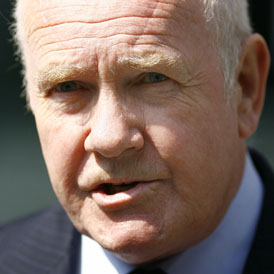AV referendum: Why you should vote No
As the campaigns for and against a switch to the Alternative Vote step up a gear for the 5 May referendum, the former Home Secretary and now Labour Peer, John Reid, makes the case for a No vote.

Britain is in grave danger of sleepwalking into an expensive electoral disaster. We could soon be saying goodbye to one person, one vote while being landed with a system that is useless for choosing a Government.
A referendum on the Alternative Vote takes place on 5 May and it’s important we deliver a resounding “No”.
Nick Clegg is the main man behind this referendum. He wants us to say “Yes” to the Alternative Vote as a method of electing MPs – despite having previously regarded it as nothing more than “a miserable little compromise”.
Presumably he has persuaded himself that any system that results in hung Parliaments will help keep him and his party in government for many years to come.
The joy of the current system is that at most elections the people have the power – if they so wish – to throw out one government and put another one in. By saying “Yes”, we would surrender that power to the Leader of the Liberal Democrats – kingmakers in any future Parliament.
AV is bad on so many counts…the candidate who comes second or third in a constituency could be declared the winner.
AV is bad on so many counts. People who back extremist and small parties – such as the BNP – would have several bites of the electoral cherry on election day; their vote will count again and again, while people backing mainstream candidates would have to settle for one vote.
The result of this unfair system is that the candidate who comes second or third in a constituency could be declared the winner. He or she would win, not because of their talent or popularity, but because they had picked up people’s third, fourth or fifth preferences. If it sounds like a dog’s dinner it’s because the Alternative Vote is a dog’s dinner.
This complexity also makes AV a much more expensive voting system. When similar systems have been introduced in Scotland and London, the local councils had to pick up the tab for expensive vote-counting machines. When you add up the cost of the referendum, the machines and the inevitable mass education campaigns, the total cost of the Alternative Vote could hit £250 million. At a time of pay freezes and public sector cuts, is this really what we should be spending money on?
The Yes side have put forward some weak reasons for voting for AV. They have, for instance suggested it would lead to MPs working harder; but I have waited in vain for one of the MPs in the Yes camp stepping forward to say he or she doesn’t work hard enough now. They say it will end expenses abuse; but quite how voting for AV will change the allowance system is left unsaid, largely because it is incredible.
‘Hopeless’
Put bluntly, AV would be a hopeless system for electing the House of Commons. In fact, it’s regarded as hopeless the world over. Fiji had it until they succumbed to a military coup. Australia has it – but had to make voting compulsory because turnout dropped drastically after its introduction. And Papua New Guinea is the only other place on earth that uses it. Meanwhile, the present UK system – which we gave the world – has some 2.5 billion adherents.
I’m not a fan of the Coalition Government, and I don’t want to see further coalitions. But this is also a matter that should have been above party politics, or inter-party survival deals.
I want clear-cut democracy where the people decide who should rule, and where parties are forced to keep their manifesto promises.
The No to AV campaign is a truly cross-party campaign, supported by the majority of Labour MPs and Peers, the Conservative Party and thousands who support no political party, but who don’t want to throw out a voting system simply because Nick Clegg wants them to.
It strikes me that when you understand AV you can’t say anything but “No”.